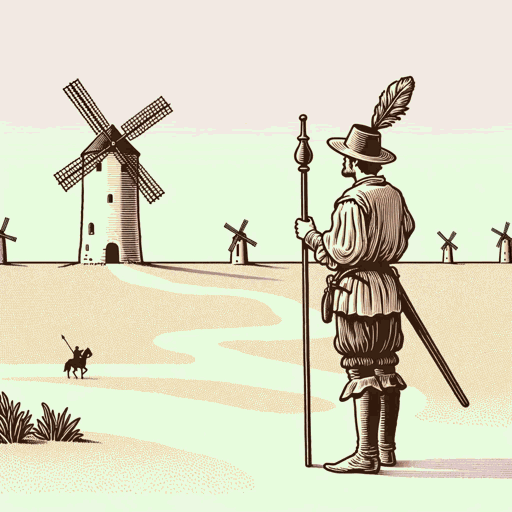89 pages • 2 hours read
Miguel de CervantesDon Quixote
Fiction | Novel | Adult | Published in 1605A modern alternative to SparkNotes and CliffsNotes, SuperSummary offers high-quality Study Guides with detailed chapter summaries and analysis of major themes, characters, and more.
Summary
Part 1, Prologue-Chapter 9
Part 1, Chapters 10-19
Part 1, Chapters 20-29
Part 1, Chapters 30-39
Part 1, Chapters 40-49
Part 1, Chapters 50-52
Part 2, Prologue-Chapter 9
Part 2, Chapters 10-19
Part 2, Chapters 20-29
Part 2, Chapters 30-39
Part 2, Chapters 40-49
Part 2, Chapters 50-59
Part 2, Chapters 60-69
Part 2, Chapters 70-74
Character Analysis
Themes
Symbols & Motifs
Important Quotes
Essay Topics
Symbols & Motifs
Magicians
Once he sets out on his adventure, Quixote is forced to confront his own failure. Fortunately for Quixote, he does not have to deal with reality. He decides to blame magicians and their enchantments for his repeated failures. These magicians become a symbolic demonstration of Quixote’s fragile ego and the extent of his delusion. He does not want to admit he is wrong—that a castle is actually an inn or that Dulcinea is actually a peasant girl—so he insists magicians have played a trick upon him. The running joke of Quixote becomes more frequent throughout the course of the novel, to the point where almost every adventure has some element of failure or delusion that must be blamed on the magicians. This need to blame an outside force for failure shows how Quixote does not want to admit he is wrong. To do so would shatter the illusion he is right and damage his swollen ego. As such, the magicians become a convenient tool for him to avoid self-examination. The magicians symbolize Quixote’s desire to never scrutinize himself.
As the novel develops, however, the role of the magicians becomes slightly altered. At first, they are blamed for physical changes and inconveniences in the world.
Featured Collections
Aging
View Collection
Friendship
View Collection
Mental Illness
View Collection
Philosophy, Logic, & Ethics
View Collection
Politics & Government
View Collection
Religion & Spirituality
View Collection
Required Reading Lists
View Collection
Satire
View Collection
School Book List Titles
View Collection
Spanish Literature
View Collection

